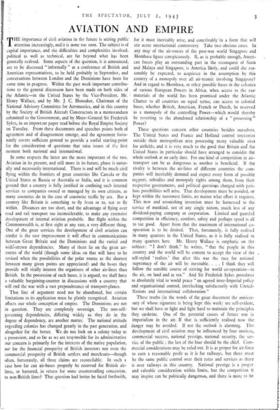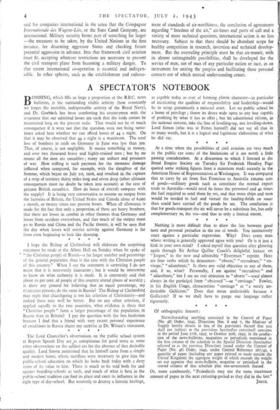AVIATION AND EMPIRE
HE importance of civil aviation in the future is seizing public T attention increasingly, and it is none too soon. The subject is of capital importance, and the difficulties and complexities involved, political as well as technical, are far beyond what has been generally realised. Some aspects of the question, it is announced, are to be discussed " informally " at a conference of British and American representatives, to be held probably in September, and conversations between London and the Dominions have been for some time in progress. Within the past week important contribu- tions to the general digcussion have been made on both sides of the Atlantic—in the United States by the Vice-President, Mr. Henry Wallace, and by Mr. J. C. Hunsaker, Chairman of the National Advisory Committee for Aeronautics, and in this country by the Society of British Aircraft Constructors in a memorandum submitted to the Government, and by Major-General Sir Frederick Sykes, in an important paper read before the Royal Empire Society on Tuesday. From these documents and speeches points both of agreement and of disagreement emerge, and the agreement fortu- nately covers sufficient ground to provide a useful starting-point for the consideration of questions that raise issues of the first moment both national and international.
In some respects the latter are the more important of the two. Aviation in its present, and still more in its future, phase is natur- ally and necessarily international. There is and will be much civil flying within the frontiers of great countries like Canada or the United States or Russia or Australia or India, and it is common ground that a country is fully justified in confining such internal services to companies owned or managed by its own citizens, as many countries do in the case of coastwise traffic by sea. But a country like Britain is something to fly from or to, not to fly within. Distances are too short, and the advantage of flying over road and rail transport too inconsiderable, to make any extensive development of internal aviation probable. But flight within the Commonwealth is, at first sight at any rate, a very different thing. One of the great services the development of civil aviation can render is the vast improvement it will effect in communications between Great Britain and the Dominions and the varied and widstrewn dependencies. Many of them lie on the great air- routes of the world (though some ideas on that will have to be revised when the possibilities of the polar routes as the shortest between many given points are appreciated) and the bases they provide will vitally interest the organisers of other air-lines than British. In the possession of such bases, it is argued, we shall have a valuable bargaining-counter in discussions with a country that will end the war with a vast preponderance of transport-planes.
That line of argument need not be abandoned, but certain limitations to its application must be plainly recognised. Aviation affects our whole conception of empire. The Dominions are not in question. They are completely sovereign. The non-self- governing dependencies, differing widely as they do in the degree of dependency, are another matter. The national attitude regarding colonies has changed greatly in the past generation, and altogether for the better. We do not look on a colony today as a possession, and so far as we are 'responsible for its administration our concern is primarily for the interests of the native population, not for the financial prosperity of British investors nor even the commercial prosperity of British settlers and merchants—though often, fortunately, all three claims are reconcilable. In such a case how far can air-bases properly be reserved for British air- lines, or bartered, in return for some countervailing concession, to non-British lines? That question had better be faced forthwith, for it must inevitably arise, and conceivably •in a form that will stir acute international controversy. Take two obvious cases. In any map of the air-routes of the post-war world Singapore and Mombasa figure conspicuously. If, as is probable enough, Ameri- can forces play an outstanding part in the teconquest of Siam and Malaya and Singapore, is America likely, and could she rea- sonably be expected, to acquiesce in the assumption by this country of a monopoly over all air-transit involving Singapore? And in regard to Mombasa, or other possible bases in the colonies of various European Powers in Africa, whet, access to the raw materials of the world has been promised under the Atlantic Charter to all countries on equal terms, can access to colonial bases, whether British, American, French or Dutch, be reserved as a monopoly of the controlling Power—which .would thereby be reverting to the abandoned relationship of a " possessing " Power?
These questions concern other countries besides ourselves. The United States and France and Holland control territories outside their metropolitan area possessing many valuable sites for airfields, and it is very much to the good that Britain and* the United States in particular should have arranged to consider the whole outlook at an early date. For one kind of competition in air- transport can be as dangerous as another is beneficial. If the rivalry is between the air-lines of different countries the com- panies will inevitably demand and expect every form of possible support, subsidies and monopoly rights among them, from their respective governments, and political questions charged with peri- lous possibilities will arise. That development must be avoided, or kept within the narrowest limits, no matter what effort it requires. This new and astonishing invention must be harnessed to the service of mankind, not of any single nation, much less of any dividend-paying company or corporation. Limited and guarded ,competition in efficiency, comfort, safety and perhaps speed is all to the good. Apart from that the maximum of international co- operation is to be desired. That, fortunately, is fully realised in many quarters in the United States, as it is fully realised in many quarters here. Mr. Henry Wallace is emphatic on the subject: " I don't think," he writes, " that the people in this country and the world will be content to accept the view of the . self-styled ' realists ' that after this war the race for national supremacy of the air will be inevitable. . . . I think they will follow the sensible course of striving for world co-operation—in the air, on land and at sea." And Sir Frederick Sykes postulates as absolutely vital to "worldpeace " an agreed inter-Imperial policy and organisational control, interlocking satisfactorily with United- Nations and international collaboration " These truths (in the words of the great document the anniver- sary of whose signature is being kept this week) are self-evident, but we shall have to fight and fight hard to maintain the principles they enshrine. One of the potential causes of future war is imperialism in the air. If that is sufficiently realised now the danger may be avoided. If not the outlook is alarming. The development of civil aviation may be influenced by four motives, commercial success, national prestige, national security, the ser- vice of the public ; the last of the four should be the chief. Com- mercial considerations may be ruled out. It is as proper for air-lines to earn a reasonable profit as it is for railways, but there must be the same public control over their rates and services as there is over railways in this country. National prestige is a proper and valuable consideration within limits, but the competition it may inspire can be politically dangerous, and there is more to be said for companies international in the sense that the Compagnie Internationale des Wagons-Lits, or the Suez Canal Company, arc international. Military security forms part of something far larger —the measures to be taken, by the United Nations in the first instance, for disarming aggressor States and checking future potential aggression in advance. Into that framework civil aviation must fit, accepting whatever restrictions are necessary to prevent the civil transport plane from becoming a military danger. To that extent international co-operation is essential and indispen- sable. In other spheres, such as the establishment and enforce- ment of standards of air-worthiness, the conclusion of agreements regarding " freedom of the air," air-bases and ports of call and a variety of more technical questions, international action is no less necessary. Subject to that there should be abundant scope for healthy competition in research, invention and technical develop- ment. But the overruling principle must be that air-transit, with its almost unimaginable possibilities, shall be developed for the service of man, not of man of any particular nation or race, as an instrument for uniting the peoples and facilitating those personal contacts out of which mutual understanding comes.



























 Previous page
Previous page